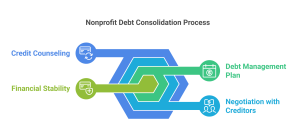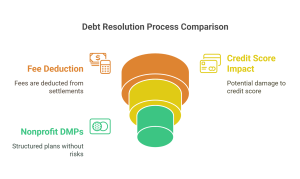Key Takeaways
- Through structured repayment plans, nonprofit debt consolidation helps individuals manage unsecured debts like credit card debt, medical bills, and personal loans.
- Unlike for-profit companies, nonprofit agencies prioritize consumer financial well-being, offering lower fees, reduced interest rates, and credit score protection.
- Debt settlement carries risks like damaged credit scores, tax liabilities, and potential lawsuits, making nonprofit debt management a safer alternative.
- Nonprofit credit counseling agencies provide financial education and personalized repayment plans to ensure long-term stability.
- Seeking help from a reputable nonprofit organization can be a responsible and effective step toward becoming debt-free.
Introduction
Managing debt can be overwhelming, especially when juggling multiple payments with high interest rates. Nonprofit debt consolidation offers a structured way to regain financial stability. In this guide, we’ll explore what nonprofit debt consolidation is, how it works, the types of debts eligible for consolidation, and those not.
Purpose of This Guide
The purpose of this guide is to provide practical, easy-to-implement strategies that can help individuals avoid unnecessary debt, manage their finances efficiently, and achieve long-term financial stability. By understanding the common causes of debt and learning how to make smart financial decisions, you can take control of your financial future and work toward a debt-free life.
What Is Nonprofit Debt Consolidation?
Nonprofit debt consolidation is a service nonprofit credit counseling agencies offer to help individuals manage their debt more effectively. Instead of taking out a new loan, these organizations negotiate with creditors to lower interest rates and combine multiple payments into a manageable monthly payment. The goal is to make debt repayment more affordable while avoiding the pitfalls of high-interest loans or for-profit debt relief programs.
How Nonprofit Debt Consolidation Works
The process of nonprofit debt consolidation typically involves several steps. First, individuals meet with a certified credit counselor who assesses their financial situation and provides personalized recommendations. If consolidation is deemed suitable, the credit counseling agency creates a debt management plan (DMP) tailored to the individual’s financial needs.
Next, the agency negotiates with creditors to lower interest rates, waive late fees, and set up a structured repayment plan. Instead of making multiple payments to different creditors, the individual makes one monthly payment to the nonprofit agency, which distributes funds to creditors. Over time, debts are repaid through the structured plan, often within three to five years, helping individuals regain financial stability without accumulating more debt.

Types of Debt Eligible for Nonprofit Debt Consolidation
Nonprofit debt consolidation is typically designed for unsecured debts. High-interest credit card balances can be consolidated into a structured repayment plan, helping individuals pay off their debt faster while reducing interest rates. Unsecured personal loans may also be included in a DMP, allowing individuals to simplify their repayment process and potentially lower their interest rates.
Unpaid medical bills from hospitals or healthcare providers can often be negotiated and included in a debt management plan, helping individuals manage healthcare-related financial burdens. Department store credit cards with high interest rates can also be consolidated into a single payment, reducing financial stress and avoiding excessive interest charges.
Payday loans may be eligible for consolidation depending on the lender and circumstances. This can help break the high-interest, short-term borrowing cycle and create a structured path to repayment. Debts sent to collections may also be included in a consolidation program, relieving individuals struggling with aggressive collection agencies.
Additionally, any revolving credit line not backed by collateral may be eligible for consolidation. This helps borrowers organize their financial obligations and avoid late fees, ensuring better management of their financial commitments.
Top 10 Nonprofit Debt Consolidation Companies
| Company Name | Website | Unique Selling Proposition (USP) | Rating |
|---|---|---|---|
| GreenPath Financial Wellness | www.greenpath.com | Personalized debt management plans and financial education | 4.8/5 |
| National Foundation for Credit Counseling (NFCC) | www.nfcc.org | Nation’s largest nonprofit credit counseling organization | 4.7/5 |
| Money Management International (MMI) | www.moneymanagement.org | Extensive financial literacy programs | 4.6/5 |
| InCharge Debt Solutions | www.incharge.org | Free credit counseling and lower interest rates | 4.7/5 |
| American Consumer Credit Counseling (ACCC) | www.consumercredit.com | Affordable debt management plans | 4.5/5 |
| DebtWave Credit Counseling | www.debtwave.org | Comprehensive financial education and counseling | 4.6/5 |
| ClearPoint Credit Counseling | www.clearpoint.org | Budgeting assistance and debt relief programs | 4.7/5 |
| Consolidated Credit | www.consolidatedcredit.org | Personalized credit counseling services | 4.5/5 |
| Advantage Credit Counseling Service | www.advantageccs.org | Debt management and financial education | 4.4/5 |
| Cambridge Credit Counseling | www.cambridge-credit.org | Customized debt relief solutions | 4.6/5 |
Company Performance Comparison
| Company Name | Customer Satisfaction | Success Rate | Years in Business | Accreditations | Service Coverage |
|---|---|---|---|---|---|
| GreenPath Financial Wellness | 95% | 85% | 60 Years | NFCC, HUD | Nationwide |
| National Foundation for Credit Counseling (NFCC) | 93% | 88% | 70 Years | NFCC, BBB | Nationwide |
| Money Management International (MMI) | 92% | 86% | 65 Years | NFCC, HUD, BBB | Nationwide |
| InCharge Debt Solutions | 90% | 84% | 30 Years | NFCC | Nationwide |
| American Consumer Credit Counseling (AC) | 89% | 82% | 29 Years | NFCC, BBB | Nationwide |
| DebtWave Credit Counseling | 87% | 80% | 20 Years | NFCC | Nationwide |
| ClearPoint Credit Counseling | 86% | 79% | 50 Years | NFCC, BBB | Nationwide |
| Consolidated Credit | 85% | 78% | 27 Years | NFCC, HUD | Nationwide |
| Advantage Credit Counseling Service | 84% | 77% | 31 Years | NFCC, BBB | Nationwide |
| Cambridge Credit Counseling | 83% | 76% | 25 Years | NFCC | Nationwide |
Debts That Are Ineligible for Nonprofit Consolidation
While nonprofit debt consolidation can be a helpful tool, not all types of debt qualify. Secured loans, such as mortgages and auto loans, cannot be included since they are tied to collateral. Federal and private student loans have separate consolidation and forgiveness programs, making them ineligible for nonprofit debt consolidation.
Tax debts owed to the IRS or state authorities require direct negotiation with tax agencies. Additionally, what Are Debt Collection Communications? Court-ordered debts cannot be consolidated, including child support, alimony, or lawsuit settlements. While financially burdensome, utility bills are generally not eligible for consolidation under these programs.
However, GreenPath Financial Wellness and Money Management International (MMI) can provide financial counseling and alternative solutions for handling these ineligible debts. Organizations like the National Foundation for Credit Counseling (NFCC) offer personalized credit counseling to help individuals navigate alternative repayment strategies for tax debts and court-ordered obligations. While these debts cannot be directly consolidated, credit counselors can offer guidance on restructuring payments and negotiating repayment plans with respective authorities.
For individuals struggling with secured loans, InCharge Debt Solutions provides budgeting assistance to help them prioritize debt payments while working toward financial stability. Additionally, nonprofits like American Consumer Credit Counseling (ACCC) offer debt education programs to help borrowers understand their options when facing debts that cannot be consolidated.
How to Pay Off Debt
Paying off debt requires a strategic approach.
Start by listing all your debts, including balances, interest rates, and minimum payments. This helps in creating a structured repayment plan.
Next, choose a repayment strategy. The Debt Snowball Method focuses on paying off the smallest debts first, while the Debt Avalanche Method prioritizes debts with the highest interest rates to minimize overall interest payments.
Making extra payments whenever possible, negotiating lower interest rates, and avoiding new debt while repaying existing obligations can accelerate debt elimination. If you feel overwhelmed, seeking professional help from a credit counseling agency or financial advisor can provide relief and guidance.
Will debt consolidation hurt my credit?
Debt consolidation may initially lower your credit score due to a hard inquiry and closing of old accounts. However, your credit score can improve over time as you make timely payments and reduce debt balances; if you opt for a debt management plan (DMP) through a nonprofit, your accounts may be closed, temporarily affecting your credit. However, consistent, on-time payments and reduced credit utilization can ultimately boost your score in the long run.
Is there a debt relief program from the government?
The U.S. government doesn’t offer general debt relief for personal loans or credit cards. However, specific programs include IRS tax debt relief (Offer in Compromise), student loan forgiveness, and mortgage relief programs. Nonprofit organizations like GreenPath Financial Wellness and NFCC help individuals create structured debt repayment plans. Always be cautious of scams claiming “government debt relief” for general debts, as legitimate options mainly exist for specific situations like student loans and taxes.
Is Freedom Debt Relief a nonprofit?
Freedom Debt Relief is a for-profit company specializing in debt settlement, not nonprofit debt consolidation. It negotiates with creditors to reduce the total amount owed, but this process may involve fees and potential damage to your credit score. In contrast, nonprofit organizations such as Money Management International (MMI) and InCharge Debt Solutions offer structured debt management plans (DMPs) without settlement risks. Nonprofits focus on reducing interest rates rather than negotiating lump-sum settlements.
Who is the most reputable debt consolidation company?
The most reputable nonprofit debt consolidation companies include the National Foundation for Credit Counseling (NFCC), GreenPath Financial Wellness, Money Management International (MMI), and InCharge Debt Solutions. These organizations offer Debt Management Plans (DMPs) that consolidate payments and lower interest rates. They are accredited by NFCC and HUD, ensuring legitimacy and transparency. Always research customer reviews, BBB ratings, and accreditations before choosing a company, as reputable nonprofits do not charge upfront fees for debt assistance.

How to get rid of $30K in credit card debt?
To pay off $30K in credit card debt, consider a debt management plan (DMP) from a nonprofit like GreenPath Financial Wellness or MMI, which consolidates payments and lowers interest rates. Other strategies include snowball (smallest debt first) or avalanche (highest interest first) methods. If eligible, a balance transfer card with 0% APR can help. Avoid risky options like payday loans. Deb settlement or bankruptcy may blast resort options if struggling, but they can harm credit scores.
What is the disadvantage of debt consolidation?
Debt consolidation can have downsides, such as initial credit score drop, longer repayment terms, and potential fees if using a for-profit service. If you fail to meet payments, you may still face collections. Some creditors do not participate in debt management plans (DMPs), limiting effectiveness. Also, secured loans (like mortgages) are not eligible for consolidation. While nonprofit debt consolidation helps, it requires financial discipline to avoid reaccumulating debt after completing the plan.
Conclusion
Avoiding debt requires financial discipline, planning, and smart spending habits. Key strategies include building an emergency fund, budgeting, saving regularly, and making informed borrowing decisions.
By implementing these tips, you can start your journey toward financial freedom. Make a budget, set financial goals, and take proactive steps to secure a debt-free future.
For more financial guidance, visit:
National Foundation for Credit Counseling (NFCC) – www.nfcc.org
Federal Student Aid – Loan Repayment – studentaid.gov
Consumer Financial Protection Bureau (CFPB) – www.consumerfinance.gov



